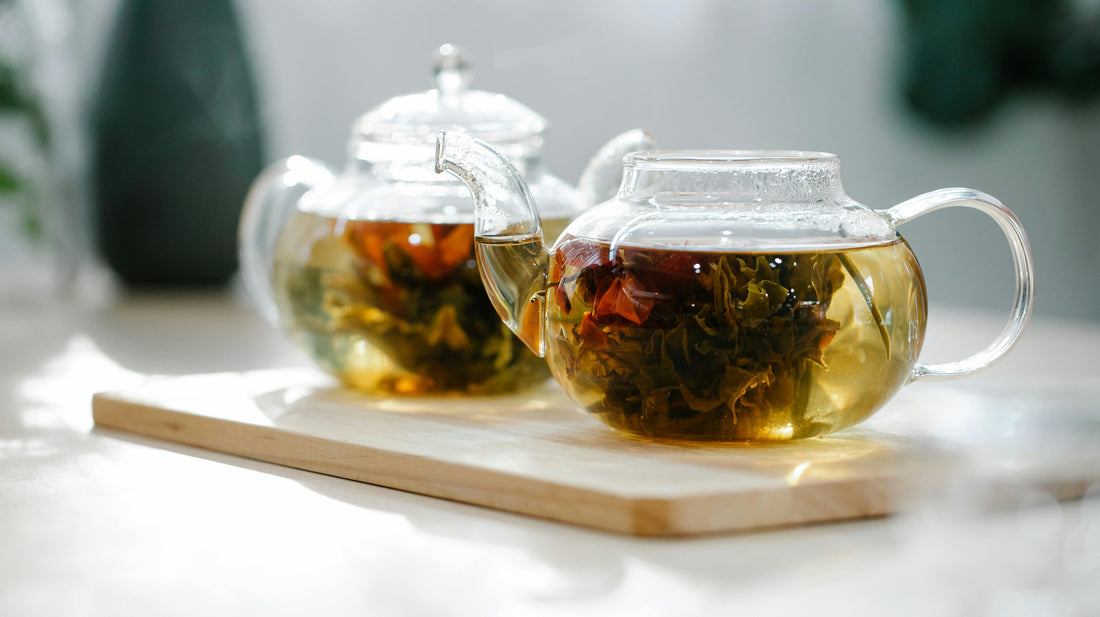
What's the Difference Between Herbal and Decaf Tea?
Share
Understanding Herbal vs Decaf Tea: A Guide for Tea Lovers
With countless tea varieties available, choosing the perfect cup can feel overwhelming. For caffeine-sensitive tea enthusiasts, terms like "caffeine-free" and "decaffeinated" often cause confusion. These terms may sound similar but have distinct meanings. Add in the diversity of black, green, white, oolong, and herbal teas, each with unique harvesting and processing methods, and it’s easy to get lost. To clarify, we’ve broken down the differences between herbal and decaf tea, with a special focus on our best-selling decaf rooibos chai microground tea, a naturally caffeine-free favourite.
Is Herbal Tea Decaffeinated?
Most herbal teas, or more precisely "herbal tisanes," are naturally caffeine-free and not decaffeinated. Unlike true teas, herbal tisanes are crafted from a blend of herbs, roots, seeds, fruits, flowers, and botanicals, not the Camellia sinensis plant. The term "herbal tisane" is specific because true tea leaves naturally contain caffeine, while tisanes do not. In everyday language, "herbal tea" is commonly used to describe these caffeine-free beverages, making it a popular choice for those seeking a soothing, caffeine-free experience.
True teas, including black, green, white, and oolong, are derived from the Camellia sinensis plant, which naturally contains caffeine. These teas are processed through methods like steaming, rolling, pan-frying, or drying to create their distinct flavours. If you’re sipping a true tea, it either contains caffeine or has been decaffeinated post-harvest. Herbal tisanes, like in our rooibos chai decaf microground tea, are naturally caffeine-free, offering a rich, spicy flavour without the stimulant.
Note that some herbal teas may contain trace amounts of caffeine from ingredients like cacao shells, cacao husks, or yerba maté. These amounts are minimal but worth considering for those highly sensitive to caffeine.
Caffeine-Free vs Decaf Tea: What’s the Difference?
The terms "caffeine-free" and "decaffeinated" have subtle but important distinctions. "Caffeine-free" refers to tisanes made from ingredients like fruits, flowers, herbs, and spices, which never contained caffeine to begin with. Blends such as Wild Berry Hibiscus, Chamomile Citron, or Rooibos Chai are naturally caffeine-free, delivering bold flavours without any stimulants.
"Decaffeinated" teas, on the other hand, start with Camellia sinensis leaves that naturally contain caffeine but undergo a process to remove most of it. Decaf teas may retain trace amounts of caffeine, typically around 2 mg per serving, compared to the 400 mg daily limit considered safe for most adults. To qualify as decaf, a tea’s caffeine content must be reduced to 2.5% or less of its original level.
How Is Tea Decaffeinated?
While herbal tisanes like our decaf rooibos chai microground tea are naturally caffeine-free, decaffeinated black, green, white, or oolong teas require a special process. Tea leaves are treated with water, carbon dioxide, or organic solvents to remove caffeine before packaging. This ensures that decaf teas contain only minimal caffeine, making them suitable for those avoiding stimulants.
Why Choose Our Rooibos Chai Decaf Microground Tea?
At Old Growth Beverages, we specialize in microground tea, a finely ground form that maximizes flavour and health benefits in every cup. Our best-selling rooibos chai decaf microground tea is a naturally caffeine-free herbal tisane, blending South African rooibos with warming spices like cinnamon, cardamom, and ginger. This bold, aromatic tea is perfect for caffeine-sensitive individuals, offering a rich, chai-inspired experience without the jitters. Whether enjoyed hot or iced, it’s a versatile, healthy choice for tea lovers across Canada.
Explore our range of microground teas, including our naturally caffeine-free options, to find your perfect cup today!
We are proudly Canadian! We are 100% owned and operated in Canada, made and packaged in Vancouver, British Columbia. Support local, buy Canadian! 🇨🇦
